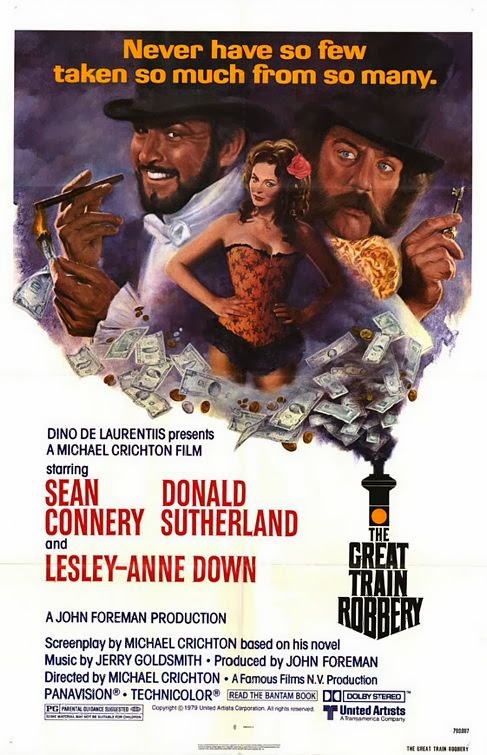There’s a very specific sub-genre of film that I just can’t get enough of, and that’s the 70’s Victorian caper film. There was a time in the 1970’s when several period Victorian-era films were made that essentially were what we would call today “caper films”. They show some sort of criminal enterprise and the various trials and travails in its execution. Sometimes these are shown from the point of view of the criminals, and sometimes from the point of view of the folks trying to capture said criminals.
Take, for example, The Great Train Robbery (1978). Starring Sean Connery and Donald Sutherland, it shows the painstaking preparation leading up to the first-ever robbery of a moving train in England in 1855. There’s a shipment of gold being transported to pay the soldiers fighting in the Crimean War, and the crooks must secure four keys to open the safes on the train before they can actually pull off the heist. I love the great period costumes and sets, there’s wonderful humor throughout (but not enough to turn it into a farce) and both Connery (who did his own stunts, including running along the top of a train going 55 mph) and Sutherland are spot-on as the calculating rogues orchestrating the robbery. Bonus points for the twist at the end.
The inverse of the genre is, of course, best served by Sherlock Holmes. Aside from the straight adaptations of the original Holmes stories (I personally prefer the Jeremy Brett versions that were originally shown on PBS from 1984-1994), the 1970’s came up with two very different takes on the character. The Seven Percent Solution (1976) features Nicol Williamson (who played Merlin in the film Excalibur) as Holmes and Robert Duvall as Dr. Watson. The real “caper” here is Watson’s plan to trick Holmes into going to Vienna to meet Dr. Sigmund Freud, played by Alan Arkin, to assist with Holmes’ addiction to cocaine. Naturally, they stumble upon a real mystery while in Vienna, and the two plots intermingle nicely. A lot of excellent performances here, not without some humor (in particular the tennis match between Freud and the villainous Baron Karl von Leinsdorf, played by Jeremy Kemp).
Finally, we come to The Private Life of Sherlock Holmes (1970), which is less of a “caper” film than a more traditional Sherlock Holmes adventure, but which I nonetheless feel deserves inclusion here for its pitch-perfect presentation of Victorian London, even though the film has a decidedly… goofy quality in places, as if it couldn’t decide if it wanted to be a serious movie or a comedy. Robert Stevens stars as Holmes, but I think Christopher Lee as his brother Mycroft steals the show. It’s also one of the more fantastical Holmes adventures I’ve seen, bringing in the Loch Ness Monster of all things, and the film is (in)famous for its inferences regarding Holmes’ sexuality, but for all the baggage I still enjoy it.










The Man Who Would Be King is one of my all time favorites.
I'd read the novel of "Seven Percent Solution" but have yet to see the film. I'm also amused to point out that Nicholas Meyer was also the screenwriter of Star Trek II: The Wrath of Kahn and Nicol Williamson was the Nome King in Disney's Return to Oz.
Although made in 1969 rather than the 70's, the Assassination Bureau, staring Oliver Reed and Diana Rigg seems to fit this sub-genre. I remember enjoying it, and it takes the idea of an Assassins' Guild and puts it in the turn of the century.
Very cool, John. I'll have to look that one up.